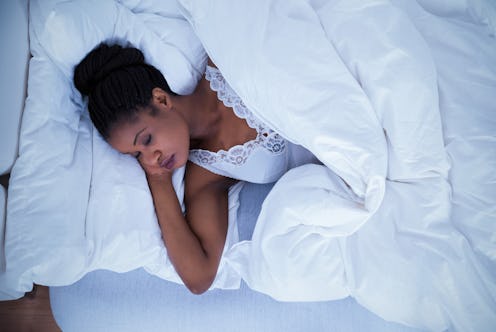Life
What Your Sleeping Position Says About Your Personality, According To Science

Sleeping position can be more than just the arrangement of limbs your cat finds a way to tread on every morning. Your sleep position can reveal a surprising amount of things about you, from your personality to clues about your health. For instance, it's now believed that it's best for people to sleep on their backs, though only eight percent of us actually do so, because it's healthiest for our spines and digestion, according to the National Sleep Foundation. However, the way your body naturally lies while sleeping can also indicate other things — like your personality, the health of your relationships, or even, possibly, other things happening in your body.
There's a big difference in sleep positions. I'm a side-sleeper, my husband occasionally decides to sleep with one knee in the air as if he's about to pull off a dance move, and my mother sleeps on her stomach without a pillow (which is a deeply unhealthy sleeping position, according to experts). And then there are the people who can sleep anywhere in any position, whether they're propped up against a wall or in a tiny economy seat on a long-haul flight. Whether your choice of sleeping position is conscious or not, it seems it's actually indicative of several aspects of your life. Here's how.
1They Can Reveal Your Personality
A study produced by the Sleep Assessment and Advisory Service in 2003 claimed that sleeping positions could provide clues to personality. It surveyed 1,000 people and connected the ways in which they commonly slept to potential personality characteristics. While this is the only study of its kind, it provides interesting clues about the ways in which we position ourselves in vulnerable times.
The BBC reports that the fetal position, which was the most common position among the people surveyed, corresponded with "hard on the outside, soft on the inside" vulnerability, while more open positions like the "log" (lying straight on one side with arms down) and the "starfish" (spread out with limbs everywhere) mean that people are more confident and giving. The study found links between sleeping flat on one's back with straight arms and quiet, reserved personalities, while people who hug pillows or reach out limbs towards others in bed need connection in their relationships.
How you sleep, according to this theory, is an expression of your emotional needs, issues and approach to life. While it needs to be studied more to be confirmed, sleeping positions have a long evolutionary history; a study in 2015 found that great apes like orangutans, which are close relatives to humans, sleep comfortably on their fronts or backs, while more distant relatives like gibbons have more disturbed, erratic sleep. We've evolved to rest more comfortably, which has given our brains the potential to make more connections and grow bigger. Sleep is also when we're most vulnerable and under-protected, so there's logic in assuming we'll choose postures that we think are safe.
2They Can Show The State Of Your Relationship
Multiple studies have found that the positions you choose with your partner when you're sleeping correlate to different elements of your relationship. According to studies collected by the Huffington Post, closeness in general is associated with closeness in bed, particularly at the start of a relationship. Nurturing positions that involve a lot of entwined limbs can signify intimacy, but so can sleeping back to back, especially if your bodies remain touching while you do; that's a sign of security.
A fascinating study in 2014 found that touching your partner in your sleep appeared to correlate heavily to your happiness in your relationship. It found that "94 percent of couples who spent the night in contact with one another were happy with their relationship, compared to just 68 percent of those that didn't touch," the lead author Professor Richard Wiseman explained in a press release. The research also found that closeness mattered; 86 percent of couples who slept less than an inch apart rated their relationship as happy, while only 66 percent of those who slept over 30 inches apart did.
3They May Provide Clues About Health
Various sleep positions have been tied to health issues; sleeping on your back, for instance, raises the likelihood of snoring, while The New York Times reports that sleeping on your right side can aggravate heartburn and sleeping on your left calms it. However, there's another potential consequence of your sleeping position: it may affect the collagen in your face.
Dermatologists and scientists aren't in precise agreement about whether sleeping on your side does in fact impact the collagen in your face, aka the protein that keeps your skin elastic. Dermatologist Debra Jaliman told HuffPost that short-term wrinkles are normal for side-sleepers: "If you crunch your face against a pillow you can get them." The National Sleep Foundation, meanwhile, lays out the evidence for longer-term effects. "When younger people wake up after sleeping on their sides, their skin instantly goes back to where it was because their skin has higher levels of collagen and elastic tissue. But as you age and have spent decades sleeping this way, those creases don’t disappear after a few hours" they explain.
I personally love the idea of having years of lovely, restful sleep written on my face along with laugh lines. It's not entirely clear if this is the case for everybody or if collagen is really affected in this way, though.
4
Sleep positions can reveal more than you might think. Even though you might go to bed on your side and wake up on your back, or otherwise mess around with your sleeping position, it's interesting to see what health clues your sleeping position may point to. While more research needs to be done to clearly define these potential links, it's a fascinating field of study.